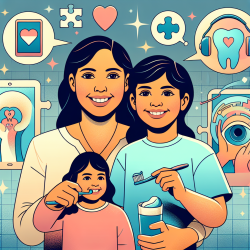Introduction
In the realm of pediatric health care, oral health is a critical component that directly influences a child's overall well-being and quality of life. Unfortunately, disparities in oral health care access and outcomes persist, particularly among Latino families and children with Autism Spectrum Disorder (ASD). A recent study titled "Oral Care Experiences of Latino Parents/Caregivers with Children with Autism and with Typically Developing Children" sheds light on the unique challenges faced by these communities and offers insights that can guide practitioners in creating more effective interventions.
Understanding the Barriers
The study, conducted with 32 Latino parents/caregivers from 18 families, reveals several barriers to oral health care. Key themes include:
- Vulnerability and Mistrust of Providers: Many Latino families express distrust towards healthcare providers due to their ethnic minority status and, in some cases, immigration status. This mistrust can deter families from seeking necessary dental care.
- Prioritizing Children's Needs: Parents often prioritize their children's oral health over their own, sometimes at the expense of their personal health needs.
- Cultural Influences: Cultural and familial practices, such as using baking soda for oral care, significantly impact how families approach dental health.
Implications for Practitioners
For practitioners, understanding these barriers is crucial in developing effective strategies to improve oral health outcomes for Latino children. Here are some actionable steps practitioners can take:
- Build Trust: Establishing a trusting relationship with families is essential. Practitioners should engage in culturally sensitive communication and demonstrate respect for the family's cultural values and experiences.
- Tailored Interventions: Develop interventions that incorporate cultural practices and address specific barriers faced by Latino families. This may include providing resources in Spanish or offering flexible appointment scheduling to accommodate parents' work schedules.
- Community Engagement: Collaborate with community organizations to reach families who may be hesitant to seek care. Community-based programs can serve as a bridge to connect families with necessary services.
Encouraging Further Research
While this study provides valuable insights, further research is needed to explore the intersection of Latino identity, cultural practices, and disability status in oral health care. Future studies could examine the effectiveness of culturally tailored interventions and explore how these approaches can be scaled to reach a broader population.
To read the original research paper, please follow this link: Oral Care Experiences of Latino Parents/Caregivers with Children with Autism and with Typically Developing Children.
Conclusion
By understanding and addressing the unique challenges faced by Latino families, practitioners can play a pivotal role in reducing oral health disparities and improving outcomes for children. Through culturally informed care and community engagement, we can empower families to prioritize oral health and ensure that every child has access to the care they need.










